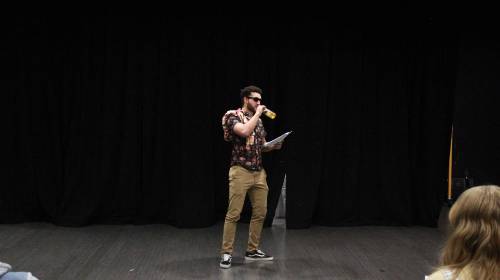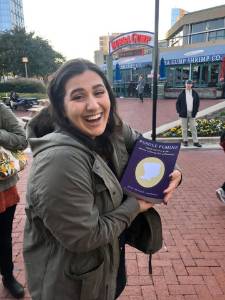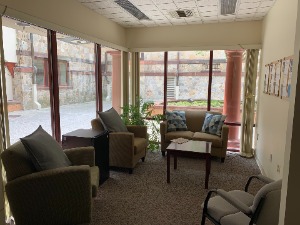Humanities 2020 Annual Report
The 2019-20 Humanities division PDF report can be downloaded by using the link below. In addition, to the PDF report, expanded and supplemental content has been added below which includes additional highlights and activities that occurred in the Humanities division during the 2019-20 academic year.
Humanities 2019-20 Annual Report Web Supplement
As we indicated in the Annual report, the Humanities had a busy and productive year in spite of the pandemic. During the Fall semester, we held many well attended events co-sponsored by a variety of departments and the Center for the Humanities. In the spring, we started off with a full slate and ended up adapting many annual events and activities to virtual experiences and canceled others.
The Center for Humanities provides support to students, faculty and departments across the Humanities. You can learn more about its signature events, such as the Humanities Symposium, the Jerome S. Cardin Memorial Lecture and the Big Dig on the Center for Humanities website.
Classics, a vibrant if small department, had a busy year. September kicked off with a performance of the The Odyssey: The Belly of the Beast, by Odds Bodkin, a perennial favorite. Upper-level Latin students in Fall 2019 performed their translations of scenes from a Roman comedy.
The department Christmas party featured students and faculty sharing a festive meal complete with a buche de noël . Entertainment included a curated selection of film clips related to the ancient world. The Classics student lounge continued its makeover with one of the majors painting a picture for the Classics lounge.

The Communication department, which is home to GreyComm Studios, WLOY, and Apprentice House, as well as the graduate Emerging Media Program and a large undergraduate program with several concentrations, had a successful year. In January the study tour, a component of the Backpack Journalism class, went to London and Paris. Over 10 days, students gathered video and audio materials, survived and learned to navigate Paris in the middle of the largest transportation strike in its history, and created incredible stories about their experiences when they returned over the Spring ’20 semester.
In March the department co-sponsored a career event, Pathway to Multimedia Storytelling, which brought together five humanities alumni representing a range of careers from health communication to sports marketing, for a panel discussion that focused on careers and different aspects of digital storytelling. Panelists shared insights from their experiences about internships, habits of minds, and activities to help students prepare to enter the workplace successfully.
The department continued its efforts to collaborate with other departments, crosslisting several courses with Fine Arts, including Graphics I, Posters! (an art history class), and Photojournalism. Greg Hoplamazian, Ph.D., collaborated with a data science student on a research project, developing the Tweet Collection Tool, that they presented at the Broadcast Education Association conference.
 On the media front, Apprentice House published a record twelve titles with several more in the pipeline; WLOY continued its community outreach with What Happens Next, and Greycomm Studios worked with the Office of Mission Integration to create a series of videos, entitled
Encountering the Mission.
On the media front, Apprentice House published a record twelve titles with several more in the pipeline; WLOY continued its community outreach with What Happens Next, and Greycomm Studios worked with the Office of Mission Integration to create a series of videos, entitled
Encountering the Mission.
The English department kicked off the fall 2019 semester by hosting the American Shakespeare Company troupe’s performances, and they closed the semester with their annual holiday celebration. The Feast of Pure Imagination, held December 9, featured about 75 students, faculty, alumni and guests who gathered in the Hug Lounge for the annual event. The event, with live music by faculty and students, games for all, and a buffet of theme-inspired food, was planned by the students in the Honors Senior Seminar, taught by Professor Nick Miller, which focused on literature with child narrators.
English faculty members had a successful year in scholarship as indicated by these highlights:
- Jean Lee Cole, Ph.D., published How the Other Half Laughs: The Comic Sensibility in American Culture, 1895-1920 (University Press of Mississippi, 2020).
- Victoria Barnett-Wood, Ph.D., is the editor of Cultural Economies of the Atlantic World Objects and Capital in the Transatlantic Imagination (Routledge 2020).
- Juniper Ellis, Ph.D., published 2 peer-reviewed articles and 1 book chapter.
- Bob Miola, Ph.D., the Gerard Manley Hopkins Professor of English,published two chapters in Cambridge Companions, won a prize for a 2019 article, was nominated by Times Literary Supplement for edition of the year (Chapman’s Homer: The Iliad), and re-edited Shakespeare’s Hamlet as a Norton Critical Edition.
The Fine Arts department had a productive year, designing new courses such as Studio Arts Three-Dimensional Design in Art and Engineering, which was crosslisted and team-taught.
The Julio Fine Arts Gallery mounted six exhibits, including one virtual show. It hosted Artist in Residence, Foon Sham, which included the exhibition Sea of Hope and a lecture by the artist in November. More than 30 students actively participated in building with Sham his upcoming work to be exhibited at the National Building Museum in December 2020. Sham also spoke with over ten classes about his work and about his artistic processes. Sham’s residency and activities were supported by grants from Center for Humanities and Education for Life, as well as the Sehn Fund. The gallery collaborated with Messina to host Visiting Artist Amy Ritter, whose work was featured in the gallery and on the Quad. Ritter’s exhibit, Built In, was linked to the Common Text, Heartland: A Memoir of Working Hard and Being Broke in the Richest Country on Earth. The closing virtual exhibit featured the Annual Student Exhibition and the Artist Trading Cards made with students’ art.
The Performing Arts had a successful fall semester with traditional performances and events but spring was cut short. Overall there was a total five music events and five theater productions. Traditional theater performances, with two directed by students, included:
- Stop Kiss, Poisoned Cup Players - October 24-27, 2019
- Love and Information - November 21-24, 2019
- American Soldiers - January 16-18, 2019
- Kid Simple: A Radio Play in the Flesh - February 20-23, 2020
American Soldier was linked to the Humanities Symposium and its theme, the Wounds of War. The spring musical, Mama Mia! was derailed by the pandemic with students and staff continuing rehearsals via Zoom and creating virtual performances to showcase their efforts.
History devoted quite a bit of time to working on their curriculum developing nine new classes:
- Global Histories of Sexuality
- Gender, Race, and Class in Modern Europe
- Histories of Intellectual Disabilities
- Law, Lawyers, and Litigants in European History
- The Modern Middle East Through Literature and Film
- African American History as Public History
- History of American Capitalism
- Global Environmental History
- Violence and Holiness in 20th Century El Salvador
Faculty achievements included publication of Public City/Public Sex: Homosexuality, Prostitution, and Urban Culture in Nineteenth-Century Paris (Temple University Press) by Andrew Ross, Ph.D. , Kelly DeVries, Ph.D., and his co-author won a Distinguished Book Award from the Society for Military History for their book Medieval Warfare: A Reader (University of Toronto Press). DeVries, with prop master Larry Zanoff, created a web series on medieval weapons for Vanity Fair.
Alumna Phoebe Labat, winner of the 2019 Whiteford Medal in History, received a presidential fellowship at Brown University to study history beginning in 2020. Sydney Johnson, 2019, will begin graduate studies in public history at University of North Carolina Charlotte.
Modern Languages & Linguistics hosted many co-curricular activities last year even with the pandemic forcing the cancellation of several annual events. One of the fall highlights was the annual study trip to Montreal, sponsored by the French section. Language sections enriched the campus through several week-long celebrations devoted to French, Italian, and Chinese, or through other events such as Arabic’s showing of the documentary Arab and American Muslims Facts: Breaking Barriers, Building Bridges. The department sponsored a Career Night for language students and held a poetry recitation contest. Although many spring events were cancelled, the department still made a big impact on the university’s cultural life with students benefiting from the activities organized by the language clubs that represent each language offered - Arabyola, Chinese, French, German, Italian, Spanish.
Students had many opportunities to use the languages and cultures studied in order to explore issues of social justice and participate in community service in Baltimore at the Esperanza Center, CASA de Maryland, Artesanos Don Bosco, and Refugee Youth Project, among others. The French section participates in the project Rendez-Vous Haiti project, founded by Loyola French instructor Catherine Savell in the wake of the 2010 earthquake in Haiti.
Philosophy made a big impact on Messina this past year with Philosophy faculty offering a total of 25 sections of Messina. They also contributed to a number of modules on equity, inclusion, and diversity to be used in Messina enrichment sessions. They offered six diversity courses, three in the fall and three in the spring. Mavis Biss, Ph.D., participated in the first High Impact Fellows cohort and led departmental discussions about high impact teaching practices. The department was one of the first to make a statement in solidarity with Black, Indigenous, and People of Color. The Philosophy Club remained active and anticipated using the new student lounge,which was completed over spring break, but the closing of campus delayed their plans.

Theology invested in upgrading their website with more information about its undergraduate and graduate programs, featuring several videos of students and faculty. It also formalized the implementation of the new language exam option for its Master of Theological Studies program. It welcomed three students from the class of 2020 into the accelerated MTS program.
Two theology undergraduate students received Catholic Studies summer research grants who were mentored by theology faculty:
- Patrick McGinnis,'22, Dignified Work (an examination of Catholic Social Teaching Documents on work and labor) directed by Father Joseph Rossi, S.J.
- Emily Zimmerman,'21, Seeking Justice: The Incarnation of the Option for the Poor in the Modern Catholic Church, directed by John Kiess, Ph.D.
Writing continued its commitment to high impact teaching, offering sixteen sections of service-learning and sixteen sections in Messina. Over fifteen students completed writing internships for credit. The Modern Masters Reading Series and Writers at Work Series had successful fall events but had to cancel, reschedule, or adapt many of the spring events. The headliner for MMRS in the Fall was Kathleen Hall Jamieson, the Elizabeth Ware Packard Professor of Communication at the University of Pennsylvania and the Program Director of the Annenberg Public Policy Center. WWS hosted four events, including two by visiting writers, award-winning novelist Rebecca Makkai in the fall and essayist and New Yorker staff writer Jia Tolentino in the spring. Both writers, who have received national recognition for their writing and have recently published an award-winning book, met with small groups of students, attended a class, and gave an afternoon presentation.
The faculty had a successful year with various books, essays, poems and scholarly articles in various stages of completion. Some highlights include, Allen Brizee, Ph.D., published "What Happens When We Fail?: Building Resilient Community-Based Research," in the October 2019 issue of Journal of Technical Writing and Communication. Craig Medvecky, Ph.D., and associate director of the Writing Center, published the book chapter Enter the Dragon: Graduate Tutor Education in the Hall of Mirrors that appears in How We Teach Writing Tutors: A WLN Digital Edited Collection.
The Writing Center once again did a great job supporting students and the Loyola mission. You can learn more about it through the new video created by the Center’s staff and peer tutors.
In the fall, the center had over 2,100 student appointments, serving over 770 unique graduate and undergraduate students. Spring required moving quickly to all online tutoring when the campus closed. Tutors still held over 920 appoints and served almost 400 unique students.Beyond working with students one-to-one on their writing, the Writing Center faculty supported the independent research of Lily Gretz '21, who shared her intermediate findings in an individual scholarly presentation at the Mid-Atlantic Writing Centers Association annual conference. She is currently working on a paper for publication.
Writing faculty working in the Center also ran workshops. Helen Hofling, MFA, presented a chapbook-making workshop and Dominic Micer, Ph.D., held an academic integrity workshop. Craig Medvecky, Ph.D., ran workshops to support the Hauber Research Fellows and the Psy.D. Externship application essays. The Writing Center participated in service learning for the Award-winning Bridges program again this fall for the 11th consecutive year.